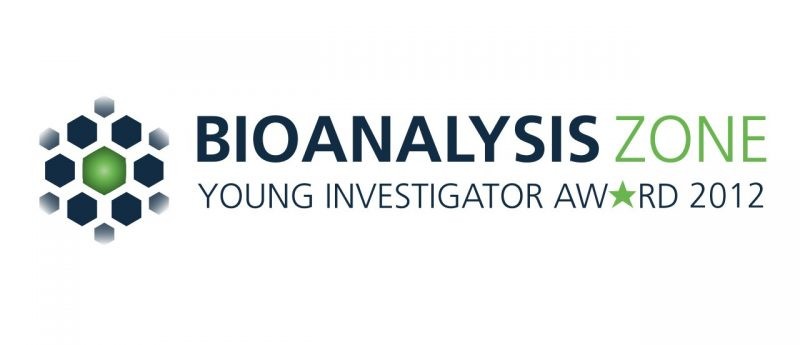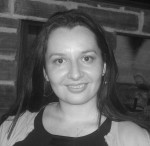2012 Young Investigator Award Finalist: Dajana Vuckovic


Nominee:
Nominated By:
Supporting Comments:
Bioanalysis Zone asked Dajana to highlight one of her favorite published articles and explain her reasoning.
Vuckovic D, de Lannoy I, Gien B et al. In vivo solid-phase microextraction: capturing the elusive portion of metabolome. Angew. Chem. Int. Ed. Engl. 50(23), 5344–5348 (2011).
What were the most difficult challenges encountered in this study? And how were they overcome?
The most difficult challenge encountered in this study was the design of suitable in vivo solid-phase microextraction (SPME) probes capable of extracting a wide range of metabolites of interest in global metabolomics. Prior to starting this project, the existing SPME coatings performed extremely poorly for the extraction of polar compounds, especially in direct-immersion mode. To address this issue and enable in vivo implementation of SPME, I performed an extensive evaluation of both silica-based and polymer-based sorbents in order to find the best material(s) to use as building blocks for the new device. I found three types of sorbent materials to be particularly useful for LC–MS metabolomics, and applied one of these types (mixed-mode coating) to show that simultaneous extraction of hundreds/thousands of metabolites was possible even when using short 2-min in vivo extraction time. In addition, I collaborated closely with Supelco to evaluate the first batches of prototypes for inter-fiber reproducibility and resistance to leaking during the sampling, as well as design appropriate QC tests to ensure good performance of all produced batches of the probes.
What made you decide to study this particular field of bioanalysis? What makes it so appealing?
I think the field of metabolomics opens up important new possibilities both in drug discovery as well as to improve our understanding of biological processes (e.g., disease). Considering that this is still a young field, there are enormous, and currently unexplored, opportunities to develop new and better untargeted methods for performing these types of analysis without sacrificing the quality of the analytical data collected. For example, from the perspective of sample preparation in global metabolomics, there are currently: (i) a lack of established QC procedures; (ii) very few and limited recovery studies to evaluate the performance of commonly accepted methods; (iii) inadequate data on stability of metabolites throughout the sample collection and preparation process; (iv) inadequate attention to ion suppression effects and their effect on data collected; and, (v) huge opportunities to characterize low-abundance metabolome in various species and sample types. Thus, I am drawn to this type of research as it is both analytically challenging and rewarding, while also highly biologically and clinically relevant. This research area perfectly combines both my passions, and I hope to work in this exciting field for years to come.
In your opinion, how has the research conducted in this study advanced the field of bioanalysis (i.e., future implications)?
The research conducted in this study has advanced the field of bioanalysis by establishing the benefits of both microextraction and in vivo sampling approaches in LC–MS metabolomics for the first time. Prior to these results, direct-immersion SPME was regarded as a technique most suitable for selective targeted analysis of few a priori-chosen compounds, thus the capability of the technique to simultaneously extract hundreds of chemically diverse compounds without issues, such as displacement ,was very surprising to the analytical community. Second, in vivo sampling configuration developed in this study represents the first application of untargeted in vivo sampling by any method in combination with LC–MS. This allowed us to challenge and critically examine the widely accepted notion that a metabolism quenching step is not necessary for studies of blood metabolome. We clearly showed distinct changes in blood metabolome when comparing blood withdrawal to in vivo SPME methods, including complete appearance/disappearance of some metabolites, and considerable changes in the concentrations of various metabolites with estimates that this unstable metabolome represents at least 5% of the whole metabolome. Thus, in vivo SPME provides a new, simple and unique tool to study unstable metabolome in both an untargeted and targeted fashion.
Colleague quotes
Here is what some of Dajana’s friends and colleagues had to say about her.
Andrew Emili, University of Toronto, Canada
“Dajana is a superb MS/analytical chemist, an exemplary scientist and a highly engaging and thoughtful colleague. Dajana is an exceptionally motivated academic, a prolific researcher and an innovative experimentalist – she makes every day, and each experiment, at the bench count. She enjoys time with her husband, which is great to see in a young married couple. She has a unique, ‘quirky’ some might say, voice/accent. I suspect she would be formidable at any thing she applied herself to, but I could imagine an exemplary career in medicine. She has sheer determination and an absolute focus on analytical excellence – she never compromises.”
Laura Gianni, University of Melbourne, Australia
“Dajana is an extremely enthusiastic and talented post-doctoral scientist with a keen interest in analytical chemistry and biomolecular studies. She is a very motivated and driven individual with a real passion for learning. Dajana is very diligent with both planning and executing experimental work, and is meticulous with all aspects of data analysis. Dajana is a keen traveller and greatly enjoys going on vacation overseas. She also enjoys shopping for fashion and accessories! Dajana is a very charismatic and down-to-earth person. She is an excellent mentor and teacher, and thus would excel in any role that involves imparting knowledge. Dajana has had previous stints in the pharmaceutical industry, and thus well placed to identify future trends in bioanalytical research.”
Barbara Bojko, University of Waterloo, Canada
“Dajana is a very organized, determined person, focused to achieve her goals. She is a hard worker who appreciates other people’s efforts. She uses her perfectionism not only at work, but also in her hobbies: modern art, especially impressionist, photography and theater. Dajana likes traveling to retrieve strength and internal balance after exhausting research work. I believe that, owing to her great tutorial skills, she would be an excellent teacher – demanding but fair. Contrary to many young scientists, she has already gained very good experience in different fields and successfully combines this knowledge in her multidisciplinary projects, making her a great collaborator.”
Rebecca Jockusch, University of Toronto, Canada
“One of Dajana’s greatest strengths is her passion for knowledge and her desire to share. This is clear from her academic output of papers, book chapters and presentations. On a more personal note, she volunteered to co-teach a graduate level course with me titled ‘The Omics Revolution and MS’. Having practical experience in both proteomics and metabolomics, Dajana was the ideal person to teach the omics portion of the course. I was especially impressed with the way Dajana handled questions in the course. Her answers encompassed both any relevant theory and, most importantly, the practical concerns of a working scientist.”
Sanja Risticevic, University of Waterloo, Canada
“This Young Investigator, Dajana, was my co-worker for 5 years. She is the most dedicated, hardworking and intelligent person I have ever known. Her key attributes are dedication, motivation and intelligence. In her day-to-day activities, Dajana has been developing bioanalytical methods, validating and applying them towards execution of a variety of bioanalytical studies. She is exceptional bioanalyt with the findings from her research studies conducted published in the most prestigious journals. During her stay at University of Waterloo, she was an excellent LC–MS laboratory manager as well as the most supportive co-worker I have ever had.”
Rosa Vatinno, Merck Serono SPA, Italy
“Dajana is a clever, perseverant, results-oriented researcher who exhibits great passion for her work. These attributes make her research seem similar to logical paths, which hit the desired mark each time. Moreover, other skills such as communication with impact and teamwork make her collaborate with colleagues with both respect and integrity. Dajana loves talking about traveling and shopping. She considers a trip similar to a fascinating discovery. She has bravery to dare and positive energy, which she gives to everybody around her. No other profession could better represent Dajana than a career in bioanalytical research. She has been working hard for years to make her professional dreams come true. For Dajana, every new scientific project is a challenge to jump into, and this will always help her to contribute to scientific discoveries in terms of innovative analytical science solutions.”



